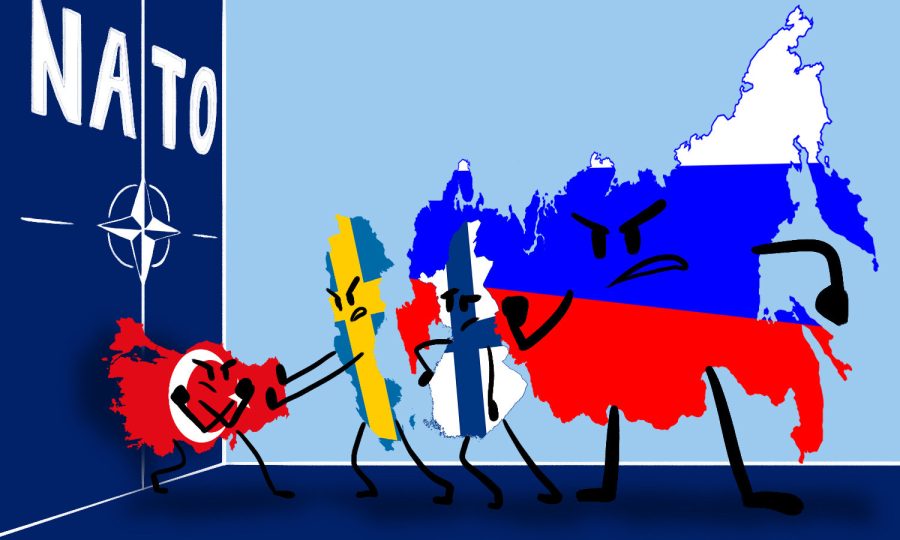Two Nordic leaders and NATO will meet with Turkish President Recep Tayyip Erdogan on Tuesday (June 28) to try to resolve the impasse after Erdogan made his objections to Finland and Sweden’s fast-track NATO membership public some weeks ago.

Sweden and Finland, two historically neutral nations, initially submitted an application to join the North Atlantic Treaty Organization (NATO) in May in reaction to Russia’s invasion of Ukraine. The two Nordic nations were accused by Turkey of backing Kurdish militant groups, which it considers to be terrorist organisations, and Turkey had resisted their admittance.
Erdogan’s meeting with the heads of Sweden, Finland, and NATO, according to the presidential spokeswoman, “does not imply we will take a step back from our position.”
Turkey had stated on June 15 that the two candidates had fallen short of its expectations and that Turkish concerns would need to be taken into account in any discussions.
Finland and Sweden’s entrance into NATO has been consistently resisted by Turkey, a member of the organisation since 1952 and possessing the second-largest military force inside the organisation.
Erdogan asserts that they are “home to various terrorist organisations,” including the People’s Protection Units (PPU) and the Kurdistan Workers Party (PKK) (YPG). For decades, the PKK has waged an armed conflict with Turkey, initially in pursuit of an independent Kurdish state, but more recently in pursuit of more Kurdish autonomy and rights inside Turkey.
The US, UK, Turkey, and the EU have all recognised the PKK as a terrorist organisation. As a terrorist organisation, it is likewise prohibited in Finland and Sweden.
In order to repress the PKK and YPG troops in Syria, Ankara seeks formal guarantees from the Nordic nations. The YPG is a force with ties to the PKK that operates in northeastern Syria’s Rojava area. They contributed significantly to the downfall of ISIS by aiding western troops in their military operations against the group in Syria. According to a Bloomberg story, Turkey has charged the YPG of assaulting its soldiers close to the border.
According to a Brookings Institution analysis, Sweden and Finland’s unwillingness to extradite PKK militants and supporters of Fethullah Gulen, whom Ankara accuses of orchestrating a botched coup attempt in 2006, has infuriated Turkey.
Additionally, Turkey requests that Sweden and Finland reverse the bans on the export of armaments to the nation that were put in place following Ankara’s military action in Syria in 2019.
Critics contend that Erdogan’s obstacles to Finland and Sweden joining NATO also have internal origins. Currently, Turkey is dealing with skyrocketing inflation and an increase in the cost of life. Erdogan’s emphasis on nationalist themes may help improve his reputation among the Turkish electorate since elections are scheduled for the following year.
On June 20, the Turkish, Swedish, and Finnish parties resumed negotiations after a lengthy pause. Ibrahim Kalin, the presidential spokesperson for Turkey, later told reporters that in order for his nation to comply with the requests of other nations, “binding pledges” were required.
It seems doubtful that the issue will be settled very soon given that Turkey has indicated that it does not intend to welcome Sweden and Finland by the time of the NATO summit (June 28–30). According to Rose Gottemoeller, a former deputy secretary general of NATO, as quoted by The Hill, it would still take the two Nordic nations at least a year to join the alliance, even if Turkey decided to waive its veto.
Finland and Sweden will both be promised military help from other members of the security alliance in the event that they do join NATO.
According to the US-based research tank Council on Foreign Relations, once Finland joins, NATO’s boundaries with Russia would more than treble, adding about 1,300 kilometres of new frontier (CRF). Additionally, NATO would have a stronger presence in the Baltic and Arctic seas.

